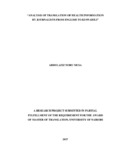| dc.contributor.author | Abdulaziz, Nuru M | |
| dc.date.accessioned | 2018-01-29T09:51:35Z | |
| dc.date.available | 2018-01-29T09:51:35Z | |
| dc.date.issued | 2017 | |
| dc.identifier.uri | http://hdl.handle.net/11295/102829 | |
| dc.description.abstract | This project analysed the translation of health information by journalists from English
to Kishwahili. The main purpose was to analyse the challenges encountered by
journalist/reporters in translating health information to the audience, then secondly I
investigated the challenges encountered by journalists in translating health
information to audience and lastly I identified the factors that can help overcome the
challenges of translating health information by reporters: borrowing, omission and
addition. Our findings showed that most of the reporters used the three procedures to
overcome the different challenges they experienced in translating health information
and especially while trying to find the equivalence of the health terminologies.
Equivalence in the translation of health information by journalists was not achieved
fully since most of the medical terminologies lack their equivalence in Kiswahili.
However, equivalence is an important element in the translation of medical
terminologies in that without it, most of the information might be given in the correct
manner hence misinforming the audience. | en_US |
| dc.language.iso | en | en_US |
| dc.publisher | University of Nairobi | en_US |
| dc.rights | Attribution-NonCommercial-NoDerivs 3.0 United States | * |
| dc.rights.uri | http://creativecommons.org/licenses/by-nc-nd/3.0/us/ | * |
| dc.subject | Translation of Health Information | en_US |
| dc.title | Analysis of Translation of Health Information by Journalists From English to Kiswahili | en_US |
| dc.type | Thesis | en_US |



